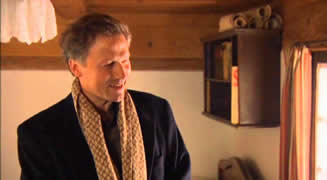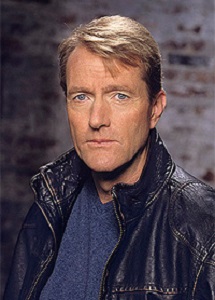De Zwitserse dichter, schrijver en filmmaker Matthias Zschokke werd geboren op 29 oktober 1954 in Bern. Zie ook mijn blog van 29 oktober 2010 en eveneens alle tags voor Matthias Zschokke op dit blog.
Uit: Der Mann mit den zwei Augen
„Eine rumänische Pflegerin hob den Hörer ab und gab ihn weiter an die Frau im Liegestuhl. Die murmelte: »Io dormo, io dormo.« Der Mann mit den zwei Augen lachte und sagte: »Seit wann können Sie Italienisch? Ich bin’s, hören Sie? Sie schlafen nicht, Sie telefonieren mit mir.« Daraufhin bekam sie einen Hustenanfall, und er verabschiedete sich. Io dormo, io dormo waren ihre letzten Worte gewesen. Am Abend starb sie. Einen Tag vorher war auch ihre einundzwanzigjährige Katze gestorben. Das hatte der Mann ihr eigentlich mitteilen wollen.
Die Katze war ihr als halbwüchsiges, verwildertes Tier zugelaufen und blieb bis zuletzt schmal und scheu. Sie hatte auffallend große, fast durchsichtige Ohren und machte nur selten, völlig unerwartet, zwei, drei Schritte auf Menschen zu, um sich dann ohne übertriebene Eile wieder von ihnen zu entfernen. Den Mann mit den zwei Augen hatte sie grundsätzlich nicht beachtet. Nur ein einziges Mal hatte sie sich ihm vorsichtig genähert, war ihm ums rechte Bein gestrichen und danach mit senkrecht erhobenem Schwanz davongegangen. Wie es dazu gekommen war, lässt sich nicht rekonstruieren. Er freute sich jedenfalls sehr darüber und dachte, nun hätte er sie für sich gewonnen.
Als junges Tier hatte sie eine porzellanzarte, rosarote Nase. Manchmal vergaß sie, die Zungenspitze ins Maul zurückzuziehen. Den Ausdruck ihres Gesichts hätte man dann als leicht besorgt umschreiben können. Sie erweckte ihr ganzes Leben lang den Eindruck, schwere Verantwortung zu tragen zu haben. Was für ein Ernst!
Was für ein zierlicher Körper! Was für kühle, weiche Pfoten! Wer keine Katzen mag, wird verständnislos den Kopf schütteln über diese Zeilen. Der Mann mit den zwei Augen konnte nicht anders, ihm gefielen Tiere. In deren Umgebung war ihm wohl, und die Freude, am Leben zu sein, flammte jeweils kurz in ihm auf. Von Pferden zum Beispiel wusste er, dass sie schlecht schlafen, wenn man sie nachts allein draußen lässt. Pferde bewachen wechselseitig ihren Schlaf. Dies zu wissen beglückte ihn.“

Matthias Zschokke (Bern, 29 oktober 1954)

